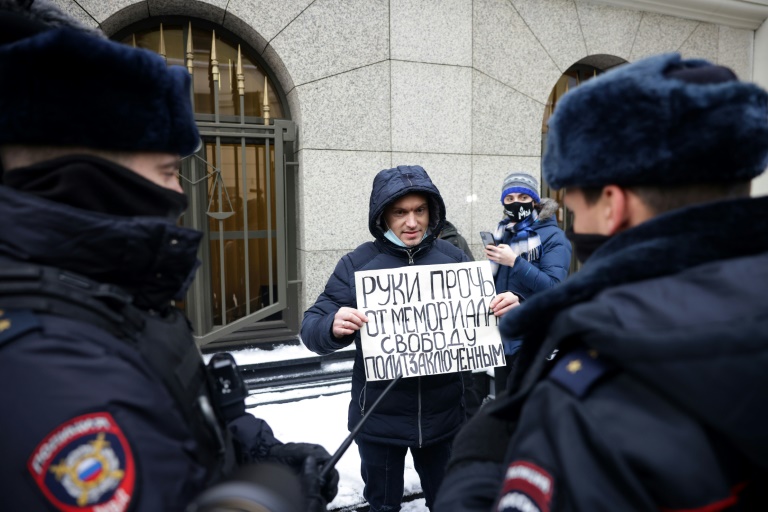Russia’s Supreme Court on Tuesday adjourned a trial against Memorial until the end of the year, as supporters urged authorities not to dissolve the country’s most prominent rights organisation.
A symbol of post-Soviet democratisation, Memorial has built a huge archive of Soviet-era crimes and has campaigned tirelessly for human rights in Russia.
In court for alleged violations of its designation as a “foreign agent”, Memorial is facing its biggest threat since it was founded by Soviet dissidents, including Nobel Peace Prize laureate Andrei Sakharov, in 1989.
Prosecutors have asked the Supreme Court to dissolve Memorial International, the group’s central structure, for alleged failures to use the “foreign agent” label on all their publications, including social media posts, as required by law.
Dozens of supporters including opposition politician Vladimir Kara-Murza gathered in sub-zero temperatures in front of the Supreme Court in central Moscow, where police vans parked nearby.
A supporter holding a placard saying “Hands off Memorial” was detained, the group said.
“It is necessary to preserve Memorial so that we can understand where we lived, where our parents lived, and where we cannot return,” said supporter Vladimir Ananich.
The 64-year-old doctor labelled the Russian authorities “grandchildren of Stalin” and accused them of trying to restore a climate of fear.
“They don’t want people to think about what is happening in the country, because it is scary,” he said.
– ‘ Foreign agent’ –
In court, prosecutors argued that Memorial did not mark itself as a “foreign agent” properly.
A prosecutor said Memorial International was using labels whose exact wording was not in agreement with Russian legislation.
Defence lawyer Maria Eismont argued there were no precise regulations stipulating “what should be marked and how.”
“The conscience of Memorial is clear,” she said.
Memorial’s founders have denied any serious violations, saying its material was properly marked and that only an insignificant number of documents may have been missing the tag.
The hearing was adjourned until December 28.
Supporters of the group say its closure would signal the end of an era in Russia’s post-Soviet democratisation process.
After the trial began on November 25, activists asked President Vladimir Putin to intervene.
But Putin told his human rights council that Memorial had been advocating on behalf of “terrorist and extremist organisations”.
Memorial has been compiling a list of political prisoners that includes religious minorities banned in Russia and Putin’s most prominent critic Alexei Navalny, whose political organisations were closed this year.
– ‘Friend of the people’ –
Russia’s two living Nobel Peace Prize winners — the last Soviet president Mikhail Gorbachev and Novaya Gazeta newspaper editor Dmitry Muratov — urged prosecutors to withdraw their claims.
In his Nobel acceptance speech in Oslo on Friday, Muratov pointed to “contradicting trends” in modern Russia.
He noted that Putin supported building a monument to Memorial’s first chairman Sakharov, while prosecutors are demanding the group be eliminated.
“Memorial is not an ‘enemy of the people,'” Muratov said.
“Memorial is a friend of the people.”
More than 120,000 people signed a petition urging authorities to drop the case.
The trial comes in a year that witnessed an unprecedented crackdown on Putin opponents, including the jailing of Navalny in February.
But the move to shutter Russia’s top rights group stands out and would have been unimaginable a few years ago.
Authorities have brought another case against the group’s Human Rights Centre, which is also accused of violating the “foreign agent” law and is facing another charge of defending “extremist and terrorist activities”.
The second trial began November 23, and the next preliminary hearing is scheduled to take place on Thursday.
Memorial has spent decades cataloguing atrocities committed in the Soviet Union, especially in the notorious Gulag network of prison camps.
The organisation also campaigned for the rights of political prisoners, migrants and other marginalised groups and has highlighted abuses, particularly in Chechnya.











